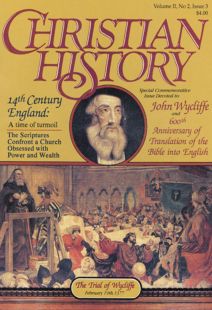The Parson
Since Chaucer and Wycliffe were contemporaries, scholars debate whether Chauer’s “Parson’s Tale” in the Canterbury Tales is a disguised Wycliffite sermon. The Parson is introduced in the epic with the words, “I smelle a Lollere in the wynd.” Some feel The Parson is Chaucer’s tribute to Wycliffe. The following is from the Prologue to the Canterbury Tales and is adapted from the original Midland English by Ruth M. Stauffer.
A kindly Parson took the journey too.
He was a scholar, learned, wise, and true.
And rich in holiness though poor in gold.
A gentle priest: whenever he was told
That poor folks could not meet their tithes that year,
He paid them up himself; for priests, it’s clear
Could be content with little, in God’s way.
He lived Christ’s Gospel truly every day,
And taught his flock, and preached what Christ had said.
And even though his parish was widespread,
With farms remote, and houses far asunder,
He never stopped for rain or even for thunder;
But visited each home where trouble came:
The rich or poor to him were all the same.
He always went on foot, with staff in hand;
For as their minister, he took this stand:
No wonder that iron rots if gold should rust!
That is, a priest in whom the people trust
Must not be base, or what could you expect
Of weaker folk? The Shepherd must perfect
His life in holiness that all his sheep
May follow him, although the way is steep,
And win at last to heaven. Indeed, I’m sure
You could not find a minister more pure.
He was a Christian both in deed and thought;
He lived himself the Golden Rule he taught.
By Geoffrey Chaucer
[Christian History originally published this article in Christian History Issue #3 in 1983]
Reprinted from Adventures in English Literature by R.B. Inglis and Dr. J. Spear; Harcourt, Brace and Company, Inc., Copyright 1958.Next articles
Zwingli - Father of the Swiss Reformation
The 500th anniversary year of the birth of Ulrich Zwingli is a good time to take a new look at the Zurich reformer.
the EditorsBlack Death Inspires Zwingli’s Plague Hymn
Zwingli wrote a hymn when he almost died of the plague.
the EditorSupport us
Christian History Institute (CHI) is a non-profit Pennsylvania corporation founded in 1982. Your donations support the continuation of this ministry
Donate



